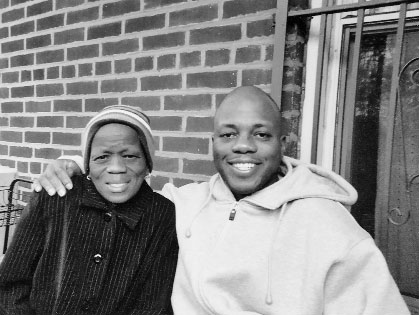By Keith Crandell
After 17 years in 13 prisons around the state, Jim Davis is out on parole. One day last week he walked out of a lockup in Queens, where he had spent the final few days of his long imprisonment. His fellow inmates urged him to head for the nearby McDonald’s and order a #9. He did. A #9 consists of a fish sandwich, a large serving of fries and a large Coke.
Later that day, he pronounced it a “wonderful meal.” But something else about his stop at McDonald’s impressed him even more. When he went to the counter to place his order, the service attendant said, “Can I help you, sir?”
“Sir! She called me ‘sir!’ Not ‘inmate.’ Sir!”
It is probable that nobody had called him by that respectful term in 17 years.
And that was part of his entry into civilian life.
To my joy, he passed his parole hearing in January. I don’t know exactly what chain of events led to his successful hearing. His previous application had been rejected, to his dismay. I do know that Grandpa Al Lewis, once a comic character with “The Munsters” and lately an advocate for prison reform on WBAI, played a part. Although now ill, for several years Lewis has sought pen pals for people in prison. One volunteer was my oldest friend, Frank Irwin of Brooklyn. He carried on a regular correspondence with Jim Davis.
Last year Frank passed along to me the thick file of letters and documents that Jim had sent from the Otisville (N.Y.) Correctional Facility. I wrote a column on Jim’s plight for The Villager last October. As Jim’s January parole hearing approached, Frank sent copies of The Villager piece to every member of the Parole Board. Two city councilmembers from Brooklyn, Charles Barron and Letitia James, agreed to send letters of support. The sentencing judge from all those years ago wrote in support. So did several staff members at Otisville.
At the hearing, The Villager article was cited by parole commissioners, noting particularly that Jim was not armed at the time of the crime and left before the shooting took place. Jim to this day is remorseful for what took place and expressed this remorse to the commission.
Whatever credit is due to Grandpa Al and Frank Irwin and various people who endorsed his bid for freedom, it is clear that Jim Davis himself played the major role. During those long years in prison, he worked against the odds, changing himself into a man who could convince the skeptics on the Parole Board that he was worthy of a new shot at freedom.
Now he is out. I hope that the Parole Board and the Commission of Correction regard him as one of their success stories. He is a handsome, articulate, intelligent young man. He is a long way from the teenager who was strung out on drugs as he entered the prison system in the 1980s. He has earned a Bachelor’s of Science degree. He has completed a list of vocational courses as long as your arm. Most important, he is motivated.
He wants to do good in the world and he has devoted a lot of his prison time to people-oriented work. He has earned a a Certificate in Ministry and Human Services from the New York Theological Seminary. He has helped train fellow prisoners on anger management and AIDS/H.I.V. prevention. He is certified as a drug counselor. He has talked to teenagers on how to avoid getting in the same trouble he got into. He would like to work with people with AIDS and with young people.
One group he is especially interested in helping is the band of long-term prisoners he left behind in Otisville. Among those who read The Villager article last October were members of the Otisville Long Termers Committee, several of whom have written letters to The Villager.
The Long Termers Committee is a band of 20 prisoners whose combined years of incarceration, according to prisoner Antonio Calderon, totals 354 years. They have been denied parole 45 times and have served some 86 years beyond their eligible release dates, says Calderon. Now that one long termer, Jim Davis, has been released, the numbers must be adjusted a bit, but the principle remains the same. Men such as Calderon, Dalton Diaz, Ramon Gonzalez, and Paul Satterfield argue persuasively that they have paid their debts to society.
Satterfield, whose letter was published in The Villager last week, reports that he has served 21 years in jail after being sentenced to 15 years to life. He says he has been denied parole four times despite what he describes as an “excellent disciplinary record,” and education through the master’s degree level.
In Jim Davis’s opinion, the long-term prisoners at Otisville are, to use his phrase, “community ready,” far less of a threat to the community than the young gang members (Bloods, Crips, Latin Kings, etc.) he encountered in the Queens Borough lockup. Not only are they community ready, but also, Jim believes, there is little more that most of them can learn in Otisville. They have taken the courses, learned the trades. He says that some have even earned doctorates.
If Jim Davis is a notable success story for Otisville and the correctional system, might not others of these men also become success stories? I know from our correspondence with Jim Davis after he was rejected for parole that he was seriously depressed. His mother, Nadine, was quite ill with a brain tumor. She had been remarkably supportive over the years. Riding the dreary buses from New York City to prisons all over the state is no great pleasure. The longest was to a prison near Buffalo. Now Jim has moved in with her and she is delighted to have him home.
Before his first parole application he had worked and worked and worked to become a better person. He had overcome drugs and struggled for success in an enormous range of programs — some vocational programs, some people programs. When the Parole Board rejected his application, he was not only depressed for himself but fearful that his mother might not survive. Despite his anxiety and his failure to succeed at his first try for parole, he pushed himself to go all out for success the second time around.
Now he is on parole. He is hunting for work. He is meeting the stiff requirements of the system: In by 9 p.m. every night. No travel outside New York City. No alcohol. No consorting with felons. If any of Jim’s friends from Otisville gain parole, Jim won’t be able to welcome them out.
One of the restrictions that I find strange is that he is forbidden to vote — to carry out the most basic responsibility of a citizen.
Jim’s new role in society forces him to acclimate himself to a world that has changed dramatically since he was a teen. What’s new? ATM machines. Cell phones. E-mail. Faxes. Humvees. When we talked the other day, he said he’d like to do some fishing and roller-skating. Fishing is fishing. But Frank’s wife, Marianne Jackson, asked if he’d tried in-line skates. He drew a complete blank. New skating wonders await him.
Meanwhile, up in Otisville, other long-term prisoners look hopefully to their future. The most that Jim Davis can do for them is to succeed, to be the kind of success story that will give confidence to the Parole Board and the correctional system. The role of the correctional system is not an easy one. It is fraught with conflict. I happen to believe that America puts far too many people in prison for too long. But I know that among my brothers and sisters are many who have a simplistic answer: “Lock ’em up and throw away the keys.”
Jim Davis acknowledges the good work done on his behalf by several of the prison staff members over the years. His success in the years ahead will validate their work and will make it easier to release the community-ready inmates in the months and years ahead.
Read More: https://www.amny.com/news/






























